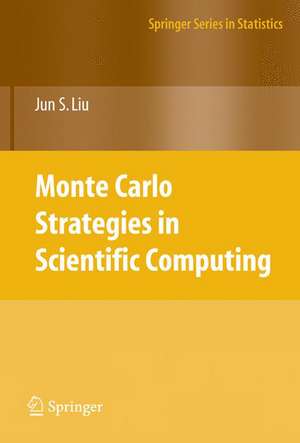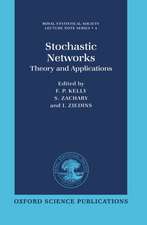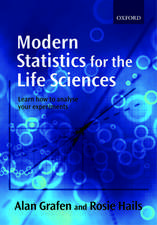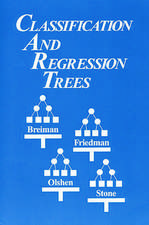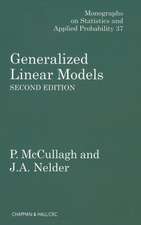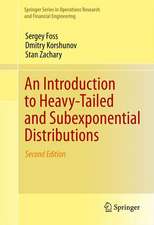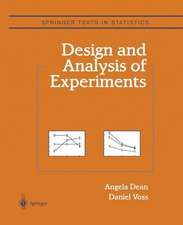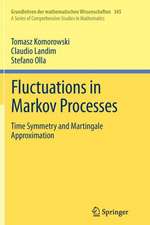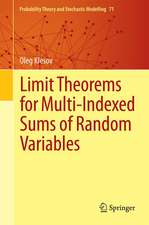Monte Carlo Strategies in Scientific Computing: Springer Series in Statistics
Autor Jun S. Liuen Limba Engleză Paperback – 4 ian 2008
Din seria Springer Series in Statistics
- 14%
 Preț: 679.60 lei
Preț: 679.60 lei - 20%
 Preț: 630.97 lei
Preț: 630.97 lei - 20%
 Preț: 816.43 lei
Preț: 816.43 lei - 20%
 Preț: 1000.84 lei
Preț: 1000.84 lei -
 Preț: 390.84 lei
Preț: 390.84 lei - 20%
 Preț: 697.13 lei
Preț: 697.13 lei - 20%
 Preț: 445.20 lei
Preț: 445.20 lei - 20%
 Preț: 881.51 lei
Preț: 881.51 lei - 18%
 Preț: 1237.14 lei
Preț: 1237.14 lei - 18%
 Preț: 967.22 lei
Preț: 967.22 lei - 18%
 Preț: 956.50 lei
Preț: 956.50 lei - 18%
 Preț: 794.25 lei
Preț: 794.25 lei - 15%
 Preț: 648.05 lei
Preț: 648.05 lei - 18%
 Preț: 1222.49 lei
Preț: 1222.49 lei - 15%
 Preț: 646.11 lei
Preț: 646.11 lei - 15%
 Preț: 647.08 lei
Preț: 647.08 lei - 15%
 Preț: 646.11 lei
Preț: 646.11 lei - 18%
 Preț: 1389.62 lei
Preț: 1389.62 lei - 15%
 Preț: 652.81 lei
Preț: 652.81 lei - 18%
 Preț: 1114.52 lei
Preț: 1114.52 lei - 18%
 Preț: 952.40 lei
Preț: 952.40 lei - 18%
 Preț: 1393.27 lei
Preț: 1393.27 lei - 18%
 Preț: 1561.68 lei
Preț: 1561.68 lei - 18%
 Preț: 1231.47 lei
Preț: 1231.47 lei - 15%
 Preț: 513.64 lei
Preț: 513.64 lei - 18%
 Preț: 893.71 lei
Preț: 893.71 lei - 15%
 Preț: 649.87 lei
Preț: 649.87 lei - 18%
 Preț: 1007.65 lei
Preț: 1007.65 lei - 18%
 Preț: 1111.67 lei
Preț: 1111.67 lei - 18%
 Preț: 1229.10 lei
Preț: 1229.10 lei - 18%
 Preț: 892.74 lei
Preț: 892.74 lei - 18%
 Preț: 913.26 lei
Preț: 913.26 lei - 18%
 Preț: 943.88 lei
Preț: 943.88 lei -
 Preț: 391.61 lei
Preț: 391.61 lei -
 Preț: 391.22 lei
Preț: 391.22 lei - 18%
 Preț: 1391.04 lei
Preț: 1391.04 lei -
 Preț: 390.84 lei
Preț: 390.84 lei - 18%
 Preț: 893.84 lei
Preț: 893.84 lei - 18%
 Preț: 960.61 lei
Preț: 960.61 lei - 18%
 Preț: 1245.34 lei
Preț: 1245.34 lei - 18%
 Preț: 964.54 lei
Preț: 964.54 lei - 15%
 Preț: 643.16 lei
Preț: 643.16 lei - 18%
 Preț: 1674.70 lei
Preț: 1674.70 lei - 15%
 Preț: 643.84 lei
Preț: 643.84 lei - 15%
 Preț: 586.37 lei
Preț: 586.37 lei - 18%
 Preț: 1004.99 lei
Preț: 1004.99 lei - 15%
 Preț: 643.34 lei
Preț: 643.34 lei - 18%
 Preț: 806.40 lei
Preț: 806.40 lei - 18%
 Preț: 727.66 lei
Preț: 727.66 lei
Preț: 1001.95 lei
Preț vechi: 1221.90 lei
-18% Nou
Puncte Express: 1503
Preț estimativ în valută:
191.75€ • 198.09$ • 159.58£
191.75€ • 198.09$ • 159.58£
Carte tipărită la comandă
Livrare economică 26 martie-09 aprilie
Preluare comenzi: 021 569.72.76
Specificații
ISBN-13: 9780387763699
ISBN-10: 0387763694
Pagini: 343
Ilustrații: XVI, 344 p.
Dimensiuni: 152 x 229 x 16 mm
Greutate: 0.5 kg
Ediția:2004
Editura: Springer
Colecția Springer
Seria Springer Series in Statistics
Locul publicării:New York, NY, United States
ISBN-10: 0387763694
Pagini: 343
Ilustrații: XVI, 344 p.
Dimensiuni: 152 x 229 x 16 mm
Greutate: 0.5 kg
Ediția:2004
Editura: Springer
Colecția Springer
Seria Springer Series in Statistics
Locul publicării:New York, NY, United States
Public țintă
ResearchCuprins
1 Introduction and Examples.- 2 Basic Principles: Rejection, Weighting, and Others.- 3 Theory of Sequential Monte Carlo.- 4 Sequential Monte Carlo in Action.- 5 Metropolis Algorithm and Beyond.- 6 The Gibbs Sampler.- 7 Cluster Algorithms for the Ising Model.- 8 General Conditional Sampling.- 9 Molecular Dynamics and Hybrid Monte Carlo.- 10 Multilevel Sampling and Optimization Methods.- 11 Population-Based Monte Carlo Methods.- 12 Markov Chains and Their Convergence.- 13 Selected Theoretical Topics.- A Basics in Probability and Statistics.- A.1 Basic Probability Theory.- A.1.1 Experiments, events, and probability.- A.1.2 Univariate random variables and their properties.- A.1.3 Multivariate random variable.- A.1.4 Convergence of random variables.- A.2 Statistical Modeling and Inference.- A.2.1 Parametric statistical modeling.- A.2.2 Frequentist approach to statistical inference.- A.2.3 Bayesian methodology.- A.3 Bayes Procedure and Missing Data Formalism.- A.3.1 The joint and posterior distributions.- A.3.2 The missing data problem.- A.4 The Expectation-Maximization Algorithm.- References.- Author Index.
Recenzii
From the reviews:
MATHEMATICAL REVIEWS
"This book is an excellent survey of current Monte Carlo methods. A strength of the book is the inclusion of a number of applications to current scientific problems. The applications amply demonstrate the relevance of this approach to modern computing. There is a fairly thorough coverage of wide variety of Monte Carlo algorithms that have arisen in diverse fields such as physics, chemistry, biology, etc., and the relationship among them. The book is highly recommended."
SHORT BOOK REVIEWS
"This is a worthwhile reference to recent advances in sequential Monte Carlo, primarily Bayesian and Markov Chain methods. To those with an interest in these topics, it is worth a read."
"This well written book discusses why Monte Carlo techniques are needed, the importance of Monte Carlo in bioinformatics, target tracking in nonlinear dynamic systems, in missing data analysis … . The references are exhaustive. I enjoyed reading this book and learned a lot about the genetic applications of Monte Carlo techniques. I recommend this book highly to statisticians and geneticists." (Ramalingam Shanmugam, Journal of Statistical Computation and Simulation, Vol. 74 (8), 2004)
"Markov chain Monte Carlo … was introduced to tackle more sophisticated and realistic statistical models as in the Bayesian approach of statistics. The author is well known in the area of MCMC methods … . The book is written in a proper style … . It provides an actual view of theoretical developments complemented by applications … . It may be highly recommended for scientists and graduate students who want to gain some insight in either the theory or application of advanced Monte Carlo methods." (Ernst Stadlober, Metrika, February, 2004)
"This book provides comprehensive coverage of Monte Carlo methods, and in the process uncovers and discusses commonalities among seemingly disparate techniques that arose invarious areas of application. … The book is well organized; the flow of topics follows a logical development. … The coverage is up-to-date and comprehensive, and so the book is a good resource for people conducting research on Monte Carlo methods. … The book would be an excellent supplementary text for a course in scientific computing … ." (James E. Gentle, SIAM Review, Vol. 44 (3), 2002)
"The strength of this book is in bringing together advanced Monte Carlo (MC) methods developed in many disciplines. … Throughout the book are examples of techniques invented, or reinvented, in different fields that may be applied elsewhere. … Monte Carlo Strategies in Scientific Computing offers a large … variety of methods and examples. Those interested in using MC to solve difficult problems will find many ideas, collected from a variety of disciplines, and references for further study." (Tim Hesterberg, Technometrics, Vol. 44 (4), 2002)
"This recent addition to the Monte Carlo literature is divided into 13 chapters and an appendix. It provides both the methodology and the underlying theory for applying Monte Carlo techniques to a broad range of problems. … In the Appendix the author outlines the basics in probability theory and statistical inference procedures. … this book is a valuable and recommended reference to Monte Carlo methods; particularly it draws the attention to recent work in sequential Monte Carlo." (Radu Theodorescu, Zentralblatt MATH, Vol. 991, 2002)
"The book gives a good introduction to current Monte Carlo methods and explains the terminology on a moderate level of abstraction. It becomes clear that any specific problem needs a tailored algorithm to be efficient. This is the reason for the emergence of variance reduction methods, importance sampling, rejection, sequential MC, Metropolis algorithms, Gibbs samplers, Markov Chain MC (MCMC), or hybrid MC with molecular dynamics. … it is one of the first attempts to showthe general principles behind an apparent zoo of methods." (W. Wiechert, Simulation News Europe, Issue 34, 2002)
"The book targets a broader topic, namely all Monte Carlo methods. … No prior MCMC knowledge is assumed, and the topics are introduced and motivated along the way. … The book mentions plenty of real life situations where the techniques discussed … may be applied. … this book is sure to help the aspiring student eager to peep into the world of Monte Carlo. At the same time its extensive bibliography and references will make it useful as a handbook for the more advanced researcher." (Arnab Chakraborty, Sankhya: Indian Journal of Statistics, Vol. 64 (1B), 2002)
“This book is an introduction to Monte Carlo methods for graduate students and researchers in applied fields, and can be used by graduate students in mathematics for a first contact with the domain or for some insight into the possible applications of Monte Carlo methods. In this book, the focus of the Monte Carlo methods presented is the evaluation of some high-dimensional integrals, such as an average property of physical systems.” (Gabriel Stoltz, Mathematical Reviews, Issue 2010 b)
MATHEMATICAL REVIEWS
"This book is an excellent survey of current Monte Carlo methods. A strength of the book is the inclusion of a number of applications to current scientific problems. The applications amply demonstrate the relevance of this approach to modern computing. There is a fairly thorough coverage of wide variety of Monte Carlo algorithms that have arisen in diverse fields such as physics, chemistry, biology, etc., and the relationship among them. The book is highly recommended."
SHORT BOOK REVIEWS
"This is a worthwhile reference to recent advances in sequential Monte Carlo, primarily Bayesian and Markov Chain methods. To those with an interest in these topics, it is worth a read."
"This well written book discusses why Monte Carlo techniques are needed, the importance of Monte Carlo in bioinformatics, target tracking in nonlinear dynamic systems, in missing data analysis … . The references are exhaustive. I enjoyed reading this book and learned a lot about the genetic applications of Monte Carlo techniques. I recommend this book highly to statisticians and geneticists." (Ramalingam Shanmugam, Journal of Statistical Computation and Simulation, Vol. 74 (8), 2004)
"Markov chain Monte Carlo … was introduced to tackle more sophisticated and realistic statistical models as in the Bayesian approach of statistics. The author is well known in the area of MCMC methods … . The book is written in a proper style … . It provides an actual view of theoretical developments complemented by applications … . It may be highly recommended for scientists and graduate students who want to gain some insight in either the theory or application of advanced Monte Carlo methods." (Ernst Stadlober, Metrika, February, 2004)
"This book provides comprehensive coverage of Monte Carlo methods, and in the process uncovers and discusses commonalities among seemingly disparate techniques that arose invarious areas of application. … The book is well organized; the flow of topics follows a logical development. … The coverage is up-to-date and comprehensive, and so the book is a good resource for people conducting research on Monte Carlo methods. … The book would be an excellent supplementary text for a course in scientific computing … ." (James E. Gentle, SIAM Review, Vol. 44 (3), 2002)
"The strength of this book is in bringing together advanced Monte Carlo (MC) methods developed in many disciplines. … Throughout the book are examples of techniques invented, or reinvented, in different fields that may be applied elsewhere. … Monte Carlo Strategies in Scientific Computing offers a large … variety of methods and examples. Those interested in using MC to solve difficult problems will find many ideas, collected from a variety of disciplines, and references for further study." (Tim Hesterberg, Technometrics, Vol. 44 (4), 2002)
"This recent addition to the Monte Carlo literature is divided into 13 chapters and an appendix. It provides both the methodology and the underlying theory for applying Monte Carlo techniques to a broad range of problems. … In the Appendix the author outlines the basics in probability theory and statistical inference procedures. … this book is a valuable and recommended reference to Monte Carlo methods; particularly it draws the attention to recent work in sequential Monte Carlo." (Radu Theodorescu, Zentralblatt MATH, Vol. 991, 2002)
"The book gives a good introduction to current Monte Carlo methods and explains the terminology on a moderate level of abstraction. It becomes clear that any specific problem needs a tailored algorithm to be efficient. This is the reason for the emergence of variance reduction methods, importance sampling, rejection, sequential MC, Metropolis algorithms, Gibbs samplers, Markov Chain MC (MCMC), or hybrid MC with molecular dynamics. … it is one of the first attempts to showthe general principles behind an apparent zoo of methods." (W. Wiechert, Simulation News Europe, Issue 34, 2002)
"The book targets a broader topic, namely all Monte Carlo methods. … No prior MCMC knowledge is assumed, and the topics are introduced and motivated along the way. … The book mentions plenty of real life situations where the techniques discussed … may be applied. … this book is sure to help the aspiring student eager to peep into the world of Monte Carlo. At the same time its extensive bibliography and references will make it useful as a handbook for the more advanced researcher." (Arnab Chakraborty, Sankhya: Indian Journal of Statistics, Vol. 64 (1B), 2002)
“This book is an introduction to Monte Carlo methods for graduate students and researchers in applied fields, and can be used by graduate students in mathematics for a first contact with the domain or for some insight into the possible applications of Monte Carlo methods. In this book, the focus of the Monte Carlo methods presented is the evaluation of some high-dimensional integrals, such as an average property of physical systems.” (Gabriel Stoltz, Mathematical Reviews, Issue 2010 b)
Textul de pe ultima copertă
This paperback edition is a reprint of the 2001 Springer edition.
This book provides a self-contained and up-to-date treatment of the Monte Carlo method and develops a common framework under which various Monte Carlo techniques can be "standardized" and compared. Given the interdisciplinary nature of the topics and a moderate prerequisite for the reader, this book should be of interest to a broad audience of quantitative researchers such as computational biologists, computer scientists, econometricians, engineers, probabilists, and statisticians. It can also be used as the textbook for a graduate-level course on Monte Carlo methods. Many problems discussed in the alter chapters can be potential thesis topics for masters’ or Ph.D. students in statistics or computer science departments.
Jun Liu is Professor of Statistics at Harvard University, with a courtesy Professor appointment at Harvard Biostatistics Department. Professor Liu was the recipient of the 2002 COPSS Presidents' Award, the most prestigious one for statisticians and given annually by five leading statistical associations to one individual under age 40. He was selected as a Terman Fellow by Stanford University in 1995, as a Medallion Lecturer by the Institute of Mathematical Statistics (IMS) in 2002, and as a Bernoulli Lecturer by the International Bernoulli Society in 2004. He was elected to the IMS Fellow in 2004 and Fellow of the American Statistical Association in 2005. He and co-workers have published more than 130 research articles and book chapters on Bayesian modeling and computation, bioinformatics, genetics, signal processing, stochastic dynamic systems, Monte Carlo methods, and theoretical statistics.
"An excellent survey of current Monte Carlo methods. The applications amply demonstrate the relevance of this approach to modern computing. The book is highly recommended." (Mathematical Reviews)
"This book provides comprehensive coverage of MonteCarlo methods, and in the process uncovers and discusses commonalities among seemingly disparate techniques that arose in various areas of application. … The book is well organized; the flow of topics follows a logical development. … The coverage is up-to-date and comprehensive, and so the book is a good resource for people conducting research on Monte Carlo methods. … The book would be an excellent supplementary text for a course in scientific computing … ." (SIAM Review)
"The strength of this book is in bringing together advanced Monte Carlo (MC) methods developed in many disciplines. … Throughout the book are examples of techniques invented, or reinvented, in different fields that may be applied elsewhere. … Those interested in using MC to solve difficult problems will find many ideas, collected from a variety of disciplines, and references for further study." (Technometrics)
This book provides a self-contained and up-to-date treatment of the Monte Carlo method and develops a common framework under which various Monte Carlo techniques can be "standardized" and compared. Given the interdisciplinary nature of the topics and a moderate prerequisite for the reader, this book should be of interest to a broad audience of quantitative researchers such as computational biologists, computer scientists, econometricians, engineers, probabilists, and statisticians. It can also be used as the textbook for a graduate-level course on Monte Carlo methods. Many problems discussed in the alter chapters can be potential thesis topics for masters’ or Ph.D. students in statistics or computer science departments.
Jun Liu is Professor of Statistics at Harvard University, with a courtesy Professor appointment at Harvard Biostatistics Department. Professor Liu was the recipient of the 2002 COPSS Presidents' Award, the most prestigious one for statisticians and given annually by five leading statistical associations to one individual under age 40. He was selected as a Terman Fellow by Stanford University in 1995, as a Medallion Lecturer by the Institute of Mathematical Statistics (IMS) in 2002, and as a Bernoulli Lecturer by the International Bernoulli Society in 2004. He was elected to the IMS Fellow in 2004 and Fellow of the American Statistical Association in 2005. He and co-workers have published more than 130 research articles and book chapters on Bayesian modeling and computation, bioinformatics, genetics, signal processing, stochastic dynamic systems, Monte Carlo methods, and theoretical statistics.
"An excellent survey of current Monte Carlo methods. The applications amply demonstrate the relevance of this approach to modern computing. The book is highly recommended." (Mathematical Reviews)
"This book provides comprehensive coverage of MonteCarlo methods, and in the process uncovers and discusses commonalities among seemingly disparate techniques that arose in various areas of application. … The book is well organized; the flow of topics follows a logical development. … The coverage is up-to-date and comprehensive, and so the book is a good resource for people conducting research on Monte Carlo methods. … The book would be an excellent supplementary text for a course in scientific computing … ." (SIAM Review)
"The strength of this book is in bringing together advanced Monte Carlo (MC) methods developed in many disciplines. … Throughout the book are examples of techniques invented, or reinvented, in different fields that may be applied elsewhere. … Those interested in using MC to solve difficult problems will find many ideas, collected from a variety of disciplines, and references for further study." (Technometrics)
Caracteristici
The author is a leading researcher in a very active area of research Emphasis is on making these methods accessible to scientists who want to apply them Includes examples from artificial intelligence, computational biology, computer vision and chemistry Includes supplementary material: sn.pub/extras
